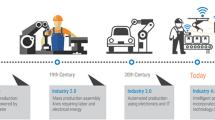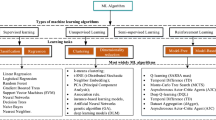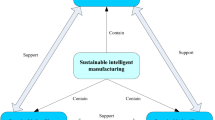Abstract
Operation in a dynamic environment requires companies to constantly adapt their manufacturing systems to stay competitive. One approach to manufacturing is the use of reconfigurable manufacturing systems (RMS). Current production planning approaches cannot model and realize the production-side adaptions available in RMS. In this article a novel planning system for modeling that continuously integrates the key characteristics of RMS in production planning and control (PPC) is presented. First, the challenges for production planning using RMS are defined. A feasible planning system is then presented, based on modeling and specification approaches, followed by a planning method to realize capacity scalability and functionality changes in planning processes. Finally, a prototypical application is outlined and the planning system is evaluated with the help of different production scenarios. The application results demonstrate the feasibility of the planning system as well as the potential improvement of typical key performance indicators in manufacturing.







Similar content being viewed by others
Abbreviations
- DML:
-
Dedicated manufacturing line
- PPC:
-
Production planning and control
- FMS:
-
Flexible manufacturing system
- RMS:
-
Reconfigurable manufacturing system
- TPT:
-
Throughput times
References
Wiendahl H-P, ElMaraghy HA, Zaeh MF, Wiendahl H-H, Duffie N, Kolakowski M (2007) Changeable manufacturing—classification, design, operation. Ann CIRP 56(2):783–809
Abele E, Elzenheimer J, Liebeck T, Meyer T (2006) Globalization and decentralization of manufacturing. In: Dashchenko AI (ed) Reconfigurable manufacturing systems. Springer, Berlin, pp 3–13
Jovane F, Westkaemper E, Williams DJ (2009) The manuFuture road. Towards competitive and sustainable high-adding-value manufacturing. Springer, Berlin
Abele E, Reinhart G (2011) Zukunft der Produktion. Herausforderungen, Forschungsfelder, Chancen (Future of manufacturing. Challenges, research areas, chances). Carl Hanser, Munich
Aurich JC, Gu Z (2007) Production function and knowledge: a strategic perspective. Prod Eng 1(2):193–198
Piller FT, Stotko CM (2003) Mass Customization und Kundenintegration: Neue Wege zum innovativen Produkt (Mass customization and customer integration: new ways to innovative products). Symposion, Düsseldorf
Reinhart G, Zäh MF (2003) Marktchance Individualisierung (Market-chance individualization). Springer, Heidelberg
Moertl M (2008) Ressourcenplanung in der variantenreichen Fertigung (Resource planning in a variant production). Utz, Munich
Mehrabi MG, Ulsoy AG, Koren Y, Heytler P (2002) Trends and perspectives in flexible and reconfigurable manufacturing systems. J Intell Manuf 13(2):135–146
Koren Y, Heisel U, Jovane F, Moriwaki T, Pritschow G, Ulsoy G, Van Brussel H (1999) Reconfigurable manufacturing systems. Ann CIRP 48(2):527–540
Tolio T, Valente A (2006) An approach to design the flexibility degree in flexible manufacturing systems. In: Proceedings of flexible automation and intelligent manufacturing conference, Limerik, pp 1229–1236
Karl F, Reinhart G, Zaeh MF (2012) Planning of reconfigurations on manufacturing resources. Procedia CIRP 3:608–613
Bruccoleri M, Lo Nigro G, Perrone G, Renna P, Noto La Diega S (2005) Production planning in reconfigurable enterprises and reconfigurable production systems. Ann CIRP 54(1):433–436
Wiendahl H-H (2009) Adaptive production planning and control—elements and enablers of changeability. In: ElMaraghy HA (ed) Changeable and reconfigurable manufacturing systems. Springer, London, pp 197–212
Sethi A, Sethi S (1990) Flexibility in manufacturing: a survey. Int J Flex Manuf Syst 2(4):289–328
Nyhuis P, Fronia P, Pachow-Frauenhofer J, Wulf S (2009) Wandlungsfähige Produktionssysteme (Changeable manufacturing systems). wt Werkstattstechnik 99(4):205–210
Geiger F, Reinhart G (2016) Knowledge-based machine scheduling under consideration of uncertainties in master data. Prod Eng 10(2):197–207
ElMaraghy HA (2005) Flexible and reconfigurable manufacturing systems paradigms. Int J Manuf Syst 17(4):261–276
Lorenzer T (2011) Wandelbarkeit in der Serienfertigung durch rekonfigurierbare Werkzeugmaschinen (Changeability in mass production with the help of reconfigurable machine tools). VDI, Düsseldorf
Abdi MR (2009) Layout configuration selection for reconfigurable manufacturing systems using the fuzzy AHP. Int J Manuf Technol Manag 17(1):149–165
Koren Y, Shpitalni M (2010) Design of reconfigurable manufacturing systems. J Manuf Syst 29(4):130–141
Hernández Morales R (2003) Systematik der Wandlungsfähigkeit in der Fabrikplanung. (Systematic of changeability for factory planning). VDI, Düsseldorf
Schuh G, Stich V (2012) Produktionsplanung und -steuerung 1. (Production planning and control 1). Springer, Berlin
Ren SC, Xu D, Wang F, Tan M (2007) Timed event graph-based cyclic reconfigurable flow shop modelling and optimization. Int J Prod Res 45(1):143–156
Zhang L, Rodrigues B (2009) Modelling reconfigurable manufacturing systems with coloured timed Petri nets. Int J Prod Res 47(16):4569–4591
Dou J, Dai X, Meng Z (2009) Graph theory-based approach to optimize single-product flow-line configurations of RMS. Int J Adv Manuf Technol 41(9–10):916–931
Chalfoun I, Kouiss K, Huyet A-L, Bouton N, Ray P (2013) Proposal for a generic model dedicated to reconfigurable and agile manufacturing systems (RAMS). Procedia CIRP 7:485–490
Galán R (2008) Hybrid heuristic approaches for scheduling in reconfigurable manufacturing systems. In: Kacprzyk J et al (eds) Metaheuristics for scheduling in industrial and manufacturing applications. Springer, Berlin, pp 211–253
ElMaraghy HA (2007) Reconfigurable process plans for responsive manufacturing systems. In: Cunha PF et al (eds) Digital enterprise technology. Springer, Boston, pp 35–44
Azab A, ElMaraghy HA (2007) Mathematical modeling for reconfigurable process planning. Ann CIRP 56(1):467–472
Shabaka AI, ElMaraghy HA (2008) A model for generating optimal process plans in RMS. Int J Comput Integr Manuf 21(2):180–194
Bensmaine A, Dahane M, Benyoucef L (2014) A new heuristic for integrated process planning and scheduling in reconfigurable manufacturing systems. J Prod Res 52(12):3583–3594
Nehzati T, Ismail N, Aziz A, Hosseini SA (2012) Research outline on reconfigurable manufacturing system production scheduling employing fuzzy logic. Int J Inf Electron Eng 2(5):813–816
Azab A, Naderi B (2015) Modelling the problem of production scheduling for reconfigurable manufacturing systems. Procedia CIRP 33:76–80
Youssef AM, ElMaraghy HA (2008) Performance analysis of manufacturing systems composed of modular machines using the universal generating function. J Manuf Syst 27(2):55–69
Eguia I, Racero J, Guerrero F, Lozano S (2013) Cell formation and scheduling of part families for reconfigurable cellular manufacturing systems using Tabu search. Simulation 89(9):1056–1072
Gyulai D, Kádár B, Kovács A, Monostori L (2014) Capacity management for assembly systems with dedicated and reconfigurable resources. Ann CIRP 63(1):457–460
Gyulai D, Kádár B, Monostori L (2014) Capacity planning and resource allocation in assembly systems consisting of dedicated and reconfigurable lines. Procedia CIRP 25:185–191
Deif AM, ElMaraghy W (2007) Investigating optimal capacity scalability scheduling in a reconfigurable manufacturing system. Int J Adv Manuf Technol 32(5–6):557–562
Scholz-Reiter B, Lappe D, Grundstein S (2015) Capacity adjustment based on reconfigurable machine tools—harmonising throughput time in job-shop manufacturing. Ann CIRP 64(1):403–406
Hees A, Reinhart G (2015) Approach for production planning in reconfigurable manufacturing systems. Procedia CIRP 33:70–75
Hees A, Lipp L, Braunreuther S, Reinhart G (2016) System for production planning for RMS. In: Univ. of Stellenbsoch (ed) Int. Conference on Competitive Manufacturing (COMA). Stellenbosch, pp 345–350
DIN 8580 (2003) Manufacturing processes. Terms and definitions, division. Beuth, Berlin
VDI 2860 (1990) Assembly and handling. Handling functions, handling units, terminology, definitions and symbols. Beuth, Berlin
Wiendahl H-P (2010) Betriebsorganisation für Ingenieure (Business organization for engineers). Carl Hanser, Munich
Hees A, Bayerl C, Van Vuuren B, Schutte CSL, Braunreuther S, Reinhart G (2017) A production planning method to optimally exploit the potential of reconfigurable manufacturing systems. Procedia CIRP 62:181–186
Acknowledgements
The research and development project that forms the basis for this paper is funded under Project No. 01MA13009A within the scope of the Autonomics for Industry 4.0 technology program run by the Federal Ministry for Economic Affairs and Energy and is managed by the project management agency ‘Technical Innovation in Business’ at the German Aerospace Center in Cologne. The authors are responsible for the contents of this publication.
Author information
Authors and Affiliations
Corresponding author
Rights and permissions
About this article
Cite this article
Hees, A., Schutte, C.S.L. & Reinhart, G. A production planning system to continuously integrate the characteristics of reconfigurable manufacturing systems. Prod. Eng. Res. Devel. 11, 511–521 (2017). https://doi.org/10.1007/s11740-017-0744-5
Received:
Accepted:
Published:
Issue Date:
DOI: https://doi.org/10.1007/s11740-017-0744-5




